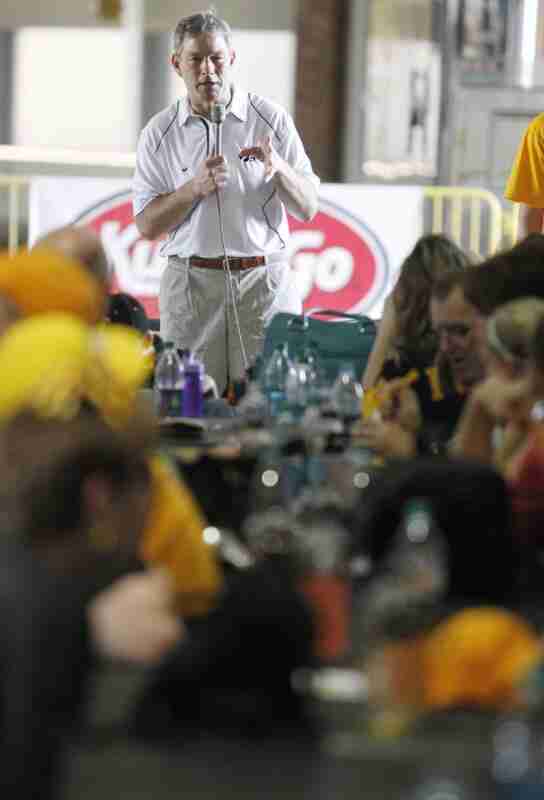IOWA CITY — On Friday, the NCAA’s immediate ban on satellite football camps was a footnote in its own press release. On Monday, it became a banner headline for every media outlet covering college football.
“The curious thing about this whole discussion is that three years ago, no one really cared about satellite camps,” Iowa coach Kirk Ferentz said Wednesday.
Satellite camps were a way for coaches to provide hands-on instruction to potential recruits outside of their campus. Iowa, for example, attended camps near St. Louis, Chicago, Indianapolis and Detroit last summer. Michigan coach Jim Harbaugh and Penn State coach James Franklin became known for their work camps at Southern colleges when Southeastern Conference coaches were barred by their leagues from leaving their campuses.
Mid-level football coaches regularly worked alongside high-income colleagues at camps. Athletes showcased their skills in front of several college coaches, often resulting in scholarship offers. Some schools have held camps and invited rival coaches, like last year when Harbaugh invited Northwestern’s Pat Fitzgerald to join his Michigan camp.
SEC coaches and administrators have regularly decried the use of satellite camps and forced an immediate ban. According to ESPN, the Big Ten Conference was the only Power-5 conference in favor of satellite camps, while the SEC, Atlantic Coast, Big 12 and Pac-12 conferences voted against. Over the weekend, coaches from leagues that voted against satellite camps told media outlets they disagreed with the decision.
“It appears that the selfish interests of a few schools and conferences have taken precedence over the best interests of potential future student-athletes,” Washington State coach Mike Leach said. told the Seattle Times.
Ferentz said Iowa “borrowed the idea” of using satellite camps after seeing Oklahoma run them in Texas. Even with some success — Iowa first discovered All-American cornerback Desmond King at Detroit’s Sound Mind Sound Body Football Academy — Ferentz is the only Big Ten coach to publicly endorse the ban on satellite camps .
RELATED: Iowa has skin in decision on off-campus education
“I would prefer that they take place on campus, and my preference is that they be administered and run by people who are on staff at this university and not by any third parties,” Ferentz said Wednesday. “I know the benefits of going the other way, but for me it would be a better deal. I know there has been talk – at least behind the scenes – about a combine-type atmosphere in which coaches and college recruiters would be out of the process and would just observe at a combine . So the kids would still get the exposure, the athletes would get a chance to show what they can do, so to speak, but the coaches wouldn’t be involved from a recruiting standpoint.
“Frankly, I think a lot of the satellite camps were really driven more by recruiting initiatives than anything else, and I think that’s kind of a no-brainer.”
Like Iowa, Nebraska has traveled to satellite camps in major markets like Miami, Atlanta and Los Angeles, according to the Omaha World-Herald. This was a primary way to introduce the coaching staff to recruits who did not have the financial means or were unlikely to make a long trip for an on-campus summer camp. Nebraska coach Mike Riley said he expects the topic to resurface, which could lead to changes rather than an outright ban.
“We’re probably not done talking about it because I think when it’s something that you see as a benefit to young people, we should continue to talk about a way to get these kinds of things.” , Riley said. “In the meantime, we’re thinking about how to compensate and what we can do with the time that we were going to spend in satellite camps with our own camps here on campus and trying to improve them and make them as good as possible .’
It’s possible the ban will be voted down when the Division I Board of Directors meets April 28. Given precedent, this is unlikely.
“I think there’s real value in it,” Riley said of the satellite camps. “I think there’s more regulation involved, whether it’s just how many of these types of camps you can have.”
Comments: (319) 339-3169; [email protected]
Iowa head football coach Kirk Ferentz welcomes Camp Courageous campers and their friends and family to Camp Courageous’ annual Hawkeye Day at Kinnick Stadium in Iowa City on Saturday, May 5, 2012. ( Cliff Jette/The Gazette)
